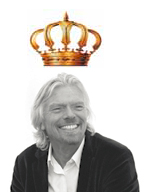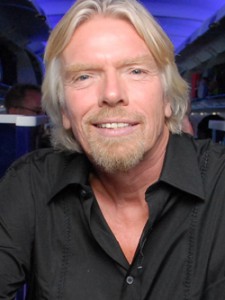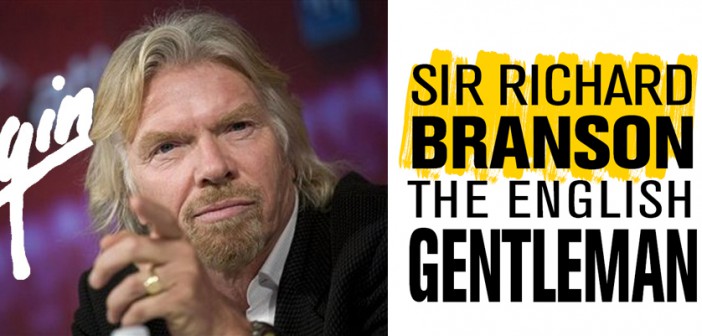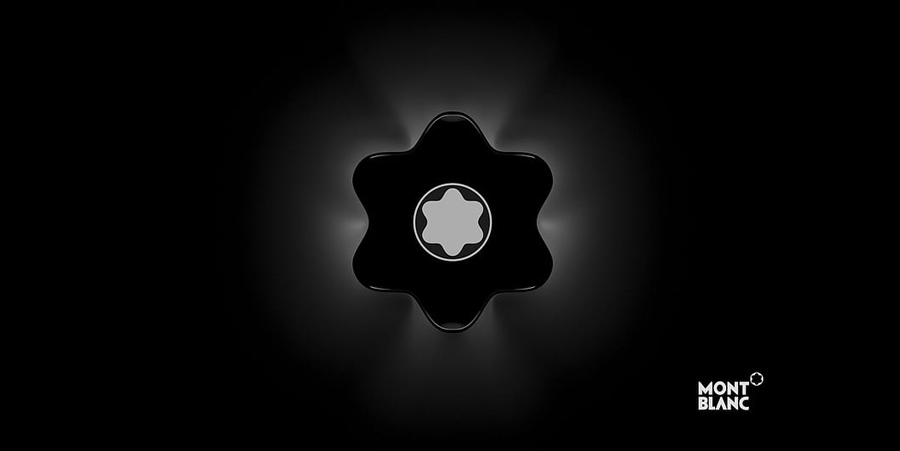Founder and CEO of the Virgin Group, he is one of the world’s most successful and admired business leaders. An adventurer who loves people, he is bent on becoming a driving force behind global change toward the building of a better and fairer world.
He’s 64 years old, a charismatic and enthusiastic, yet shy and very courteous man. He’s an iconoclast, his own trademark, and a walking show. He has done just about everything imaginable to promote his companies: disguised himself as a bride, a pirate, a pilot, tried to cross the Pacific in a balloon and to navigate the Atlantic in a motorboat, crisscrossed the sky in free-fall dives and, more recently, announced that he will travel beyond the earth’s atmosphere in his new spaceship, LauncherOne (in which Brad Pitt and Angelina Jolie, among hundreds of other passengers will also fly). He is adored by his employees, revered by entrepreneurs, idolized as a national hero in Great Britain, and envied by many of his peers. But above all, he is a model of global leadership.
Rich and Fun
His name is Richard Branson. He was born in Blackheath, a suburb of London. He has a fortune worth US$ 4.2 billion—the fourth largest in the UK and ranked 225 on a worldwide scale— and he heads up one of the world’s most glamorous business conglomerates: the Virgin Group, an empire made up of more than 300 companies that operate in fields ranging from commercial aviation to telecommunications and entertainment, and from health care to space tourism via his new Virgin Galactic enterprise. The group currently has 48,000 employees, is present in 30 countries and scored revenues of US$ 21 billion in 2011.
You might say that Branson has 360-degree success. Things have gone well for him in just about everything he has ever undertaken. He’s been married to the same woman—Joan Templeman—for the past 23 years, his children, Holly and Sam, admire and accompany him on many of his adventures, and he has a reputation today as a global leader, the pinnacle of any leadership career.
Branson likes to say that the main secret of his success is that he embarks on business ventures that are fun for him. (One example: In 1981, he bought Heaven, the biggest gay discotheque in London, and it continues to top the scene today). The second secret: that he loves people, that he is lucky enough to enjoy interacting with them, and that he doesn’t let success “go to his head”. His leadership style is frank, direct, sensible. “You need to treat people as equals. Be what people expect of one, never disappoint the team.”

A server In 1999 he was knighted in Britain for his services in the field of entrepreneurship. In 2007, Time magazine listed him as one of the most influential people in the world. The same year, the Secretary General of United Nations Ban Ki-moon awarded him Citizen of the World Award for his contribution to humanitarian and environmental causes.
Branson doesn’t believe in God. He says he was brought up by his parents to look for the best in people, and he holds that this is the most important attribute any great leader can have. “If you don’t seek the best in your team, it’s very difficult to build a successful business,” he says. “When I was young, every time I criticized someone, my mother would stand me in front of the mirror and say: ‘The flaws you see in others are actually a reflection of yourself.’ That taught me to pay close attention when I looked at others.”
But it wasn’t just his mother’s influence. Branson is dyslexic. He dropped out of secondary school at age 15 because he felt he couldn’t keep up with the rest of the class. He had trouble understanding. In his book, Screw Business as Usual (Portfolio Hardcover, 2011)—a call to the leaders of the world to change how they do business and found capitalism anew—he explains how this learning disability ended up being of great use to him in his life, because it taught him to delegate. “Dyslexia forced me to relate to the world in a different way. Since I wasn’t capable of detailed analysis, I’ve been able to develop a global view of things. I learned to value voices, stories, conversations. I learned to listen. I think it has also been the reason that I’ve detected so many business opportunities in different markets. But I know that details are of fundamental importance. That’s why I always surround myself with people who complement me, who can scrutinize things in detail.”
The World on His Shoulders
The Virgin Group CEO has a clear-cut vision of what he wants, and of what he wants to change. He has no problem sharing his power if that means multiplying it. He fully understands that in the position that he occupies—”with big money come big responsibilities”—his role is to contribute to the common good and cooperate in solving some of the world’s great challenges. He says that Man has created the problems and that it is Man who will have to solve them.
Branson wants to redefine capitalism and transform it into a force for good. His latest initiative, Capitalism 24902 (the circumference of the Earth in miles), encompasses his idea that companies should ally themselves with organizations, governments and communities in order to change the current outlook of hunger, inequality, war and environmental destruction. “Capitalism 24902 is about people, about companies placing individuals at the center of what they are doing.” In Screw Business as Usual, he argues that organizations should undertake business ventures that do good, not just that generate profits.
There are few leaders as qualified as Richard Branson to assume the leadership of global causes and to take on the needs of a dynamic, uncertain and ever-changing economy. His background is as transparent as his dreams. And Branson is a versatile leader. He has said it again and again: He doesn’t feel tied to the past, which renders him capable of constantly reinventing himself.
It was B ranson’s mother, Eve, who turned him into the “free spirit” that he is today. In his autobiographical book, Losing My Virginity, Branson tells about how, when he was five, his mother left him alone out in the country, a couple of miles from home, simply to see if he could find his way back by himself. “Every time I suffer a setback, I regroup and try again. My mother taught me not to look back with remorse, but to move on to the next challenge.”
ranson’s mother, Eve, who turned him into the “free spirit” that he is today. In his autobiographical book, Losing My Virginity, Branson tells about how, when he was five, his mother left him alone out in the country, a couple of miles from home, simply to see if he could find his way back by himself. “Every time I suffer a setback, I regroup and try again. My mother taught me not to look back with remorse, but to move on to the next challenge.”
In 2004, Branson and his employees created the Virgin Unite foundation. Its objective: for his team all across the world to be able to voluntarily take part in the generation of sustainable changes, by supporting entrepreneurial projects that approach complex social and environmental issues. An appendage of this organization is his Carbon War Room initiative, which seeks to capitalize on the ideas of radical entrepreneurs for the recapturing of carbon from the atmosphere, as a means of reversing the global warming process. Carbon
War Room, for its part, recently issued its Virgin Earth Challenge, which offers a US$ 25 million prize to whomever develops an economically feasible technological means of permanently extracting carbon from the atmosphere.
“The battle against greenhouse gases offers some great opportunities to generate earnings,” Branson told Der Spiegel magazine in a recent interview. I believe that the way to analyze projects aimed at protecting the earth’s climate is to look at them as a business model, because the only option that will get everybody to do something about climate change is if we can make money with it.”
Branson is a close friend to singing star Peter Gabriel, who is also known for his activism in human rights groups. About 13 years ago they got to talking and decided to get a group of independent world leaders together in what, eight years later was to become an organization called The Elders, an advisory group for the “global village” in the struggle for peace. En 2001, Gabriel and Branson convinced Nelson Mandela to found the group, and in 2007, the organization was officially launched. Today, former Capetown Anglican Archbishop Desmond Tutu presides over The Elders and the group has 11 members, among whom are former Brazilian President Fernando Henrique Cardozo; former US President Jimmy Carter; Mozambique’s first Education Minister Graça Machel; Gro Brundtland, the first woman prime minister of Norway and the leader who placed sustainability on the world agenda; and Lakhdar Brahimi, former foreign relations minister of Algeria and a peace mediator in armed conflicts.
Parallel to this organization, Branson is also creating a group of business leaders to design new rules for operating on the world scene. Says Branson: “These rules should judge us not just on our quarterly results, but also on a series of absolutely different priorities, such as our social contribution. If a company can become a force for good, that will be good for business. The employees will feel proud to work for it and will give much more of themselves. Businesses should have a heart. A company is a lot more than a money-making machine.”
Currently, a hundred percent of the income from the Virgin Group’s aeronautics division goes to investments in clean energy. The firm has put US$ 3 billion into developing alternative fuels for airplanes (among other projects, they are seeking to turn the burnoff from steel mill chimneys into energy). “We want to see the aviation industry go from being one of the dirtiest on the planet to being the cleanest.”
Everything Is Possible
Branson is a dreamer whose dreams come true. He says that he has been helped a lot by his philosophy of “staying away from pessimists,” who think that his dreams are impossible. “I always wanted to make a difference, ever since I was a teen-ager, to create disruptive initiatives. Anybody who wants to start a business shouldn’t be thinking about how to make a lot of money, but about how to change people’s lives, about how to do much better what others are doing badly. That’s what we think at Virgin whenever we launch an enterprise, and that’s what’s allowed us to pay the bills at the end of the month.”
He says that he never would have done many of the things that he has, if he had first asked his accountants to analyze them. Branson is an expert in quick decision-making: He has an idea in the morning and by the afternoon it has turned into a business venture. “I don’t much weigh the risk. I don’t do a lot of figuring. I mostly just dive in when I think I can improve something. We only do the numbers afterwards.”
Whenever one of his businesses gets too big, Branson divides it and creates a new company. “Keeping things simple means keeping them on a personal level.” That atmosphere of familiarity has generated a friendly, reliable culture at Virgin, a culture without hierarchies and ready for change. Branson, who seeks non-conforming and original employees, has always tried to minimize bureaucracy and maximize the entrepreneurial spirit of his people. He doesn’t believe in formal board meetings and encourages his employees to contact him directly with their ideas and with issues that call for discussion.
The first rule in the organization is to have a good time. “If the person directing the company is enjoying himself, everybody else is going to feel free to show themselves as they are,” he says. At the same time, he feels leaders should praise people in order to motivate them. “People bloom when they are celebrated. It’s like watering a plant.” For Branson, his employees come first, his clients second and the shareholders, third.
A Model to Be Followed
Richard Branson is a household word in British homes. When the BBC some years ago did a survey in which it asked the public who would be most qualified to rewrite the Ten Commandments, Richard Branson was ranked fourth, right behind Mother Teresa, the Pope and the Archbishop of Canterbury. In another survey run by the Evening Standard newspaper, people were asked, prior to the creation of the post who London’s elected Mayor should be if the city were to have one: Branson was named by an overwhelming majority.
For some reason his vast wealth doesn’t seem to bother people. Maybe it’s his credibility, his charm and the fact that he’s always seemed vulnerable. Branson owns a Caribbean Island, which, in August of 2011, became news when a score of celebrity guests-including actress Kate Winslett and her family-who were forced to flee when lightning struck the main house in the middle of the night, setting it ablaze, destroying it. Whenever he isn’t on the island himself, he rents it out to the likes of Steven Spielberg, Kevin Costner or Phil Collins.
He once said that he travels around London in taxis because he doesn’t like to make people wait for him, not even a chauffeur. “Ridiculous yachts, private planes and stretch limousines don’t do anything to make life more enjoyable. They only transmit a terrible message to the people who work with one. That money would be so much better spent in Africa “.
For several years, he lived on his boat ‘Duende ‘ on the River Thames- that was a decade after he founded Virgin– and when he was first initiating his relationship with his current wife, Joan Templeman. When their children were born, he decided to move into a house in the Holland Park area, one of London’s quietest and most beautiful neighborhoods. At first, his house also was headquarters to Virgin, until he decided to move the office to another nearby building.
“ It’s name, it’s trademark is it’s promise”, says Branson. “ You should never let inexperience stop you”. That’s the motto that has guided him since he launched his first enterprise when he dropped out of school and founded a magazine called The Student, the mission of which was to serve as a forum for debate among young people, and which, amongst other things, took a stance against the Vietnam War. Already back then, with no experience in journalism, he landed an interview with John Lennon, and got him to record an original tune which came with the issue of the magazine. “ I wanted to be a publisher, I wasn’t thinking about creating an empire”, he recalls.
He has always been bold and that has helped him establish sound reputation for leadership. Most of his companies have shaken up the industries where they operated. That’s certainly the case with the most famous ones Virgin Music and Virgin Atlantic. In the 1970’s,his recording company signed contracts with Sex Pistols that were rejected by other labels. This got him into trouble with the police, who raided his points to confiscate Sex Pistols releases, but it also positioned the firm at the forefront of a whole new genre: punk rock.
Through Virgin Atlantic, Branson changed the flying experience by offering comfort and entertainment at a time when his competitors weren’t even paying attention to their customers’ needs. He made the decision to create the airline in 1984, the same as he has many of the other decisions over the course of his career: pretty much by chance.
Virgin was born when he overheard air hostesses complaining how complex wedding preparations were. Virgin Atlantic came after a party in London, where he met a lawyer who proposed a business deal. After the bankruptcy of Laker Airways, the first airline to employ a low-cost business model, the attorney suggested joining Branson in taking advantage of a license that remained valid for flights between Gatwick Airport in England and the Newark airport in New Jersey. When he called Laker Airways founder Freddie Laker about it, Laker made a very ‘Branson-like’ suggestion: “ In order to beat British Airways and Pan Am, who have big marketing budgets, you should use your own image as free advertising “.
Naturally, that’s what the Virgin CEO has done, and continues to do today.


